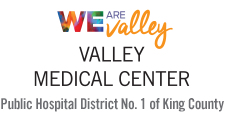Share your perspective and help improve the health of our community! We are conducting a Community Health Needs Assessment (CHNA) to help us better understand the health needs of the community our health system serves. Learn more and take the short survey.
Emergency Services: What to Expect
 Navigating the Unexpected
Navigating the Unexpected
Valley Medical Center operates the most comprehensive emergency facility in south King County. VMC's Emergency Department (ED) is a Level III Trauma Center and one of the busiest EDs in Washington State.
Trauma centers are specialized hospital emergency departments with highly trained doctors, nurses and other staff who specialize in emergency medicine, crisis response and are available 24 hours a day. Specialists are on-call around the clock for emergency consultation and care, special procedures and surgery.
Every effort is made to treat patients as quickly as possible upon arrival. Here's what to expect when you visit:
Arrival
When you arrive, you will check in with registration and our greeter, who is a medical-surgical technician. They will sign you in and escort you to triage. Triage is the French word for "to sort." Patients are treated by the level of their injury or illness, not on a first-come, first-served basis. The triage nurse determines who should be seen in what order. Emergent patients, the most serious, are seen immediately—a person experiencing a heart attack, for example. Non-urgent patients may be directed to Flex Care where our goal is to get you in and out as quickly as possible.
The Care Process and What to Expect When You Arrive in Your Treatment Room
Once you arrive in your treatment room, a primary care nurse is assigned to you. The nurse will coordinate your care with other patient care providers, such as the emergency physician and medical-surgical technicians. If you have questions or concerns, your primary care nurse is the person to ask.
Waiting During the Treatment Process
Understandably, the number one frustration with an emergency visit is waiting. VMC's ED may not appear busy to those waiting in the lobby, but there is a separate entrance for patients who arrive by ambulance. So, while you are waiting in the lobby, new and often critical patients may be arriving through another entrance. Your understanding is appreciated.
Tips for Communication
We recommend one family member or friend be the designated contact for each patient. This person can help keep others waiting for information informed about what's going on. This allows the doctor to explain everything to the contact person once, which saves precious time and helps prevent confidential medical information from inadvertently being given to the wrong people.
Crisis Support & Other Special Needs
Physicians specializing in certain areas of medicine, such as orthopedics, surgery and neurology, are on call 24 hours for specific procedures. Counselors on VMC's Emergency Room Intervention Team (ERIT) are also available at certain times to help patients and family members cope with serious crises, mental health issues, and to provide information on additional community resources. Knowing what to expect before making that unexpected trip to VMC's ED can help you get through your visit with more confidence and less anxiety. Rest assured: it is our goal to provide you with the very best in emergency care.
Treating Children
When treating minors, who are defined as unmarried persons under age 18, we are required by law to have permission from the parent or guardian before providing care. The law cites two exceptions: those minors seeking psychiatry care or treatment for sexually transmitted diseases/reproductive issues. For all other services, if a parent or legal guardian does not accompany a minor, we will call for consent. In extreme emergencies, medical treatment may be initiated without parental consent.
It is best to be fully prepared for an emergency situation in case of your absence from your child. This can be done by filling out a Consent to Treatment of Minor Children form.
Understanding Payment for Emergency Services
Emergency care is available to everyone regardless of ability to pay. However, the Emergency Department should never be a substitute for a personal physician or primary care provider. If you are in need of a primary care physician, please click here to find a Valley Medical Center physician who is the best fit for you and your healthcare needs.
Your hospital bill for emergency services will include a charge for your emergency visit which depends on the complexity of your treatment. Additional charges for medications, tests, and any special procedures may also appear on your bill. You can expect to receive a separate bill if you received services from an independent medical provider, such as an emergency physician or radiologist (for x-rays or other imaging services).
The hospital will bill your insurance company or Medicare for your emergency care. You are encouraged to check your insurance policy regarding payment for emergency care so you are aware of what it will cover. Financial counselors are available to answer any questions you may have. If you require financial assistance, our counselors can also explain what financial assistance programs are available.
Free Parking
Parking is free for patients and visitors. The South Tower garage is in the same building as the Emergency Department and is the most convenient place to park. Please do not park in the area designated for ambulance and medic entry. In the interest of public safety, vehicles parked in this area will be towed.
Additional Helpful Information
Interpreter services for non-English speaking patients and services for the hearing-impaired are gladly provided free of charge. Please inform the triage nurse if you or a family member is in need of these services.
Smoking is not allowed in any area on the Valley Medical Center campus.

